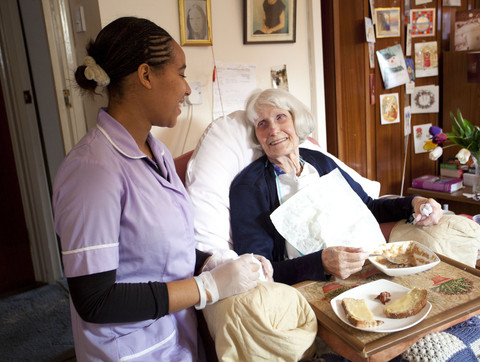In recent weeks, NHS East Riding of Yorkshire Clinical Commissioning Group (CCG) and NHS Hull CCG, working

Unique ID: SCYW0037
Caption: A residential care home. An elderly woman sitting in a chair will pillows supporting her. A meal tray. Female Carer helping female service user to eat a meal. A young woman in a blue uniform. Personal care.
Restrictions: NHS Photo Library - for use in NHS, local authority Social Care services and Department of Health material only
Copyright: ©Crown Copyright
closely with Hull and East Yorkshire Hospitals NHS Trust (HEY), have launched new transfer of care planning requirements to get patients home sooner and help combat the growing pressures the acute hospital is experiencing, exacerbated by delayed transfers of care.
The aim of the new proposals is to modernise the transfer of care planning requirements helping to improve patient experience and quality of care; enable all medically fit patients to be discharged with appropriate care and support at home wherever possible; reduce delayed transfers of care and lower readmissions.
Under the new arrangements a simple patient pathway has been introduced making it easier to discharge those patients who no longer need acute hospital care back to their own home, or to a community hospital or care home, dependent on their needs. Within 24 hours of admission staff at HEY will develop a transfer of care plan, in conjunction with patients, family and carers and complete the plan before the patient is transferred home or to another facility.
To support the new requirements East Riding of Yorkshire CCG has introduced ‘Time to Think beds’ a scheme giving patients, well enough to leave hospital, the opportunity of ongoing support and rehabilitation in a caring environment away from an acute hospital.
Patients are only ever discharged from hospital once they are medically stable. The preference is for all patients to go back to their own home, however sometimes they may need additional care and support and therefore unable to do so. This could be for a number of reasons:
- A patient is waiting to be assessed so a final decision hasn’t been made on what care package the patient requires
- A complex care package is taking time to set up at the patient’s home with family, carer and social services
- A decision has been made to move into a care home and the patient along with the family are looking into which would be the most suitable.
Jane Hawkard, Chief Officer, NHS East Riding of Yorkshire CCG said: “We want to ensure that all our patients are cared for in the right place at the right time. Once a person is well enough they should not be staying in an acute hospital, they are much better off at home.
“For an older person just 10 days in hospital can cost them 10 years of muscle loss. A patient’s independence and enthusiasm for managing their condition significantly reduces and there is a risk of catching hospital infections such as MRSA. The longer a medically fit person stays in hospital the more frail they become and remote the prospects of a return to the life they led before.
“These key changes should better prepare staff, patients their family and carers to be more active in the planning and decision making around their discharge from hospital. Ultimately we hope it will make it easier to discharge patients back to their home or temporary facility with the right package of care to suit their needs. This leads to better care, healthier people and improved health services more equipped to cope with increasing pressures, particularly over the winter period.”
Emma Latimer, NHS Hull CCG Chief Officer, said: “We continue to work with Hull City Council and other partners to reduce delays in discharge from hospital. As commissioners we have invested heavily in increasing capacity in our community services to ensure people get back to their own home and, for those who need it, clinically appropriate support or a community service is available.”
In 2012, Hull City Council led a project in partnership with NHS Hull CCG and City Health Care Partnership CIC to open 14 reablement flats in Thornton Court, off Anlaby Road. This number has now been increased to 21 flats using Hull’s Better Care Fund.
Emma Latimer added: “The flats in Thornton Court offer social and therapy services for people leaving hospital to help their return to independence and ultimately support a return to their home. These services have had a really positive impact on delayed transfers of care. Our overarching aim, however, is to prevent unnecessary admissions into hospital in the first place, and the Better Care Fund programme focuses on promoting self-care and community support enabling people being able to take better care of themselves and those they care for.”
Ends
This news release is issued on behalf of Hull and East Riding of Yorkshire System Resilience Group (SRG). For media enquiries please contact the East Riding of Yorkshire CCG communications team on 01482 672195.
Further information:
- SRGs are the forum where all the partners across the health and social care system come together to plan service delivery and manage pressures across the system using a collaborative approach. All local provider, commissioner, and social care organisations, ambulance services, mental health care, primary care and community care providers are represented within the SRG and play a key role in service delivery.
- The Better Care Fund is a national initiative focusing on the transformation and integration of health and social care services across the UK. A single pooled budget supports the NHS and local authorities to work more closely together around people, placing their well-being as the focus of health and care services. The Better Care Fund in Hull single pooled budget is around £11.3m for 2014/2015 and £30.8m for 2015/2016. For East Riding of Yorkshire it is £6.6m in 2014/2015 and £22.5m in 2015/2016.

